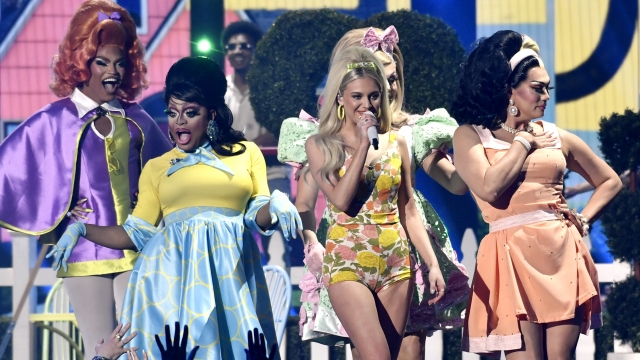In state capitols and on the streets, a wave of more than 20 bills is pulling a decades-old art form into focus. More than a dozen states have proposed legislation that would effectively restrict drag performances, many of them prohibiting performances in public places where minors could watch.
At the center of debate are "drag story hours."
Dragstoryhour.org, a non-profit with chapters across the country, describes its mission as "storytellers using the art of drag to read books to kids in libraries, schools, and bookstores."
Critics outside a drag story hour event in Michigan accused entertainers there of "grooming," or training young people and using inappropriate rhetoric to persuade them.
"Pretending to be the other sex, reading to children and obviously that's gonna cause a lot of confusion," said David Robles, who is against drag queen story time.
In March, Tennessee Gov. Bill Lee signed "Senate Bill 3" making it a criminal offense for people to engage in an "adult cabaret performance" on public property, or in a location where the performance could be viewed by a person who is not an adult.
SEE MORE: Georgia law will ban most transgender care for kids under 18
The bill defines adult cabaret performances as those featuring exotic and topless dancers, strippers, and male or female impersonators who provide entertainment that appeals to a prurient interest.
It also requires businesses where adult entertainment is not predominant, such as restaurants. to be age-restricted when hosting adult cabaret performances.
LGBTQ rights advocates, like artist ambassador "Peppermint" from the American Civil Liberties Union, argue these bills are a distraction from a larger effort to condemn the LGBTQ community.
"I do believe that this is a bit of a red herring and a scapegoat. I think what they’re saying when they’re saying groomers, they’re not saying actual groomers — they’re using that as sort of a catch-all for anything LGBT," Peppermint said.
The Gay and Lesbian Alliance Against Defamation says there were more than 140 protests or threats against drag events last year, with 20 in Texas alone.
A few months into this year, a drag story hour in Arizona was postponed after the venue learned protesters, including the far-right group "Proud Boys" planned to come and occupy all the seats.
And in New York, a man was arrested after he was accused of punching someone at a drag story hour organized by Attorney General Letitia James.
When it comes to enforcement, some LGBTQ advocates say legal barriers will stand in the way.
"We're tracking to see if there are potential First Amendment issues. Of course, the First Amendment protects artistic expression. It protects our right to fashion, to dance, to music and all of these things that are related to drag. But we also think that there's a potential equal protection argument as well," said Emerson Sykes, an ACLU senior attorney.
Sykes says they’ve been keeping a close eye on issues aimed at the LGBTQ and drag communities, and they plan to do all they can to protect them.
"We at the ACLU are doing our best to try to educate, to try to advocate against these bills ... I, as a litigator, when the time comes, will try to bring the Constitution to bear to try to protect folks' rights," he said.
Trending stories at Scrippsnews.com




